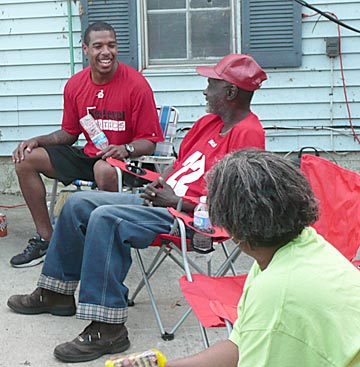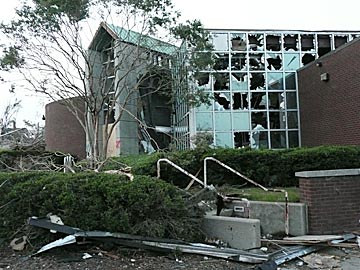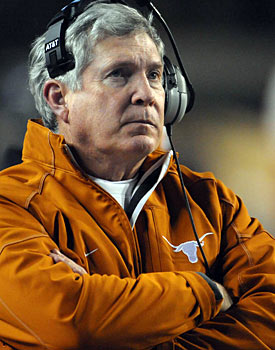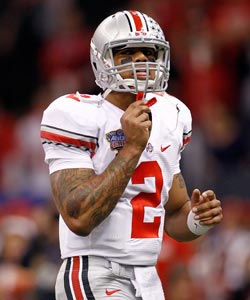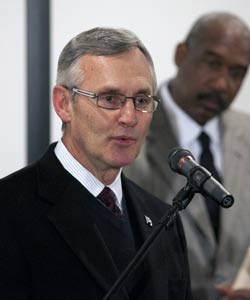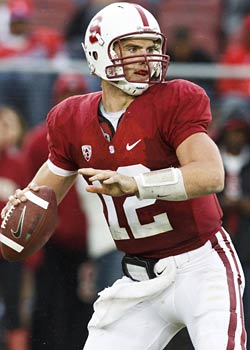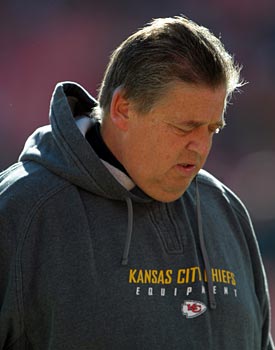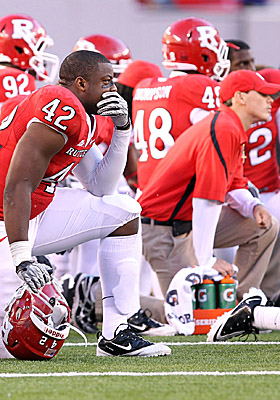First thought? It wouldn't be the first time the words "Mickey Mouse" were attached to the association's mysterious investigative process.
But give the monolithic organization credit. It tried to be a little less monolithic this week by inviting two dozen or so media members to Indy to share how its (punitive) sausage is made.
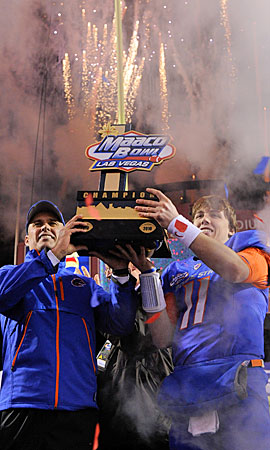 | |
Boise State's violations would appear to be minor, but Chris Petersen's program was hit with major penalties. (Getty Images) |
That's why we attended -- for a few answers. All the NCAA can do is try to be more transparent, a mandate from president Mark Emmert. Tuesday was a revealing look at that enforcement process, complete with enough potty breaks to guard against lack of constitutional control. At the end of the day, we sentenced a make-believe school to made-up penalties after a mock infractions hearing based largely, it seemed, on hearsay. That was the most realistic part of the process.
Our case had to do with "Coach Smith" at State U., who allegedly funneled test answers to four of his football players. Smith eventually was sanctioned by the infractions committee (us) after being fired by the school, but without a smoking gun to tie it all together. There was an answer key the players used to cheat that a former girlfriend of one of them told the NCAA she had seen. We never saw it. What was left was only circumstantial evidence. All four players achieved their highest semester grade in that Sociology of Sports class. The testimony was basically split among the four.
How would you feel if your livelihood was ruined without evidence you could hold in your hand? That's why our group of five mock enforcement officers (real-life media hacks) voted 3-2 against making a formal allegation. The majority of the other participants disagreed, meaning the "Experience" would proceed beyond one potty break.
Enforcement's real world is a strange enough place. Former USC running backs coach Todd McNair will never work again in college if an NCAA ruling isn't overturned by some court. Convicted felon Lloyd Lake told the NCAA, "He [McNair] knew" that the coach was aware Reggie Bush was taking money and benefits from Lake and a partner. Asked how he knew, Lake told the NCAA, "'Cause he was around a lot ..."
Read the record, and everything else -- similar to Coach Smith's case -- is circumstantial. It resulted in McNair, like Smith, being slapped with an unethical conduct charge by the NCAA. That's the association's scarlet letter. The charge makes a respected eight-year NFL veteran essentially unable to be hired at the college level. That's why McNair intends to sue the association after losing his appeal.
The NCAA seemingly didn't need Lake to nail McNair to make its case against USC. Lake has done jail time and reportedly is tied to numerous felonies. Based on such thin evidence as well as credibility issues with the witness, doesn't the NCAA need a higher standard if it is going to ruin someone's career?
"The reality is ... some of the issues that we're investigating involved people that don't have a pristine record, that are in a different world than most of us," said Julie Roe Lach, the association's vice president for enforcement. "For that reason we're going to deal with people who are doing illegal activity. That's just the nature of the recruiting business right now."
Unsavory characters (prisoners, felons, etc.) are also used in real-world court cases. The difference there is a presumption of innocence for the accused. There are cross-examinations, witnesses and either a judge or jury to decide guilt beyond a reasonable doubt. The NCAA standard for conviction is much lower. Infractions hearings are more like civil cases -- administrative as opposed to criminal -- where only "clear and convincing evidence" is needed. That's according to former infractions committee chair Jo Potuto, a bulldog in the hearing room, judging by Tuesday, and a Nebraska law professor outside of it.
That lack of true due process paints the NCAA into a PR corner. We already know the public doesn't understand the process. It really doesn't understand when the NCAA doesn't have subpoena power to compel witnesses to testify.
The public relations battle can't be won with one seven-hour session. Maybe the simple takeaway is that the enforcement staff is made up of decent, honest -- maybe a bit geeky -- folks who do their extremely complicated jobs well.
"I usually get all tingly inside when I talk about the NCAA interview requirements," said Chris Strobel, a director of enforcement, "but I'll try to control myself."
Who knew these people had a sense of humor? There was campy humor in video presentations. One witness was coerced into talking because of obnoxious accordion music played by an investigator. One interview was conducted in a bathroom stall. They told us that in the real world, interviews really have gone down in a nursing home, a prison, even a Burger King. They call them "Captain Kirks," boldly going where no one has gone before.
Ameen Najjar, a 49-year-old director of enforcement, was convincing as an indignant Coach Smith in front of the committee. Ignore his baldness and it was easy to squint and imagine Tressel in the same position on Aug. 12, when Ohio State gets its day in front of the infractions committee.
Team Enforcement can't help it if they're caught up in one of the worst-perceived aspects of college sports. To change that perception, the NCAA is in the early stages of admitting there is a problem with how it is viewed. Early in the day we were reminded there is not selective enforcement. (The old line: The NCAA was so mad at Kentucky, it hammered Cleveland State.) Perhaps not, but there is a financial difference in the way schools are able to defend themselves. Ohio State, with a huge compliance department, probably has an advantage over, say, Boise State.
One school might eventually keep its coach despite a coverup that resulted in six players competing while ineligible. The other already has been charged with lack of institutional control, in part because incoming freshmen were allowed to sleep on teammates' floors.
"The more we can pull back the veil and let people see the inner workings, the better people feel about it," Emmert said. "When something is reported inaccurately because we haven't communicated it well, it's another mess we have to clean up."
The length of cases is getting shorter, about 10 months on average. In 2000, the average case lasted more than four years. There are more folks working on them, about 50 in the enforcement department. Entering his seventh month in office, Emmert reiterated his get-tough stance that was, to be fair, similar to those made by his predecessors when they came into office.
"We need to make sure that our penalty structure and our enforcement process impose a thoughtful level of concern, and even fear, that the cost of violating rules exceeds the benefit," he said.
It is the ultimate open-ended question: When is risk going to outweigh reward? The same organization that hammered USC last year continually reminds us that every infractions committee is different, that it's not fair to compare penalties. In theory, that means the next major violator could get off lightly.
Emmert had to be proud of our little group of faux committee members. We slammed Smith and State U.: three years' probation, the loss of 10 scholarships total over two years, two years of vacated wins and a two-year postseason ban. Smith got a three-year show-cause order, meaning it would be hard for anyone to hire him, which was kind of meaningless. Like McNair, the unethical conduct charge will follow him around for the rest of his career.
Then in a Q&A session, Yahoo! Sports columnist Dan Wetzel reminded the room that two years ago the (real) committee asked the (real) NCAA board of directors to allow for stronger penalties. Potuto said the committee never got an official answer.
That would qualify as one hell of an incongruous ride at Epcot. Sometimes it's educational to watch the sausage being made. Sometimes it's as ugly as you imagine.
It was fitting that on the way out the door, we were all given a copy of the 434-page NCAA Manual. All that was missing was a pat on the back accompanied by a hearty: "Any other questions you have, it's all in there."




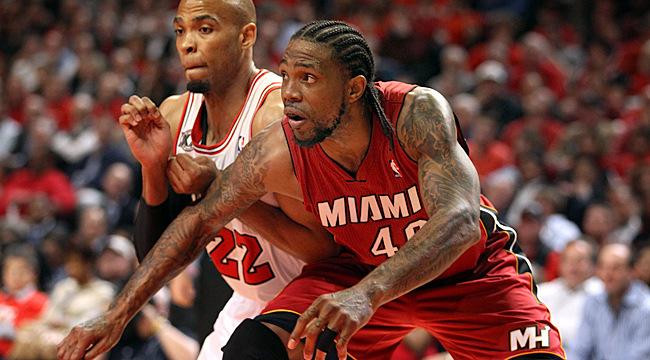



 8:18 a.m.
8:18 a.m.

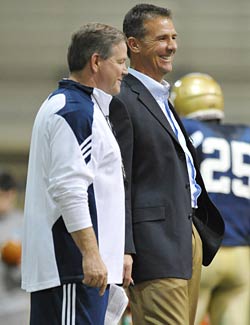
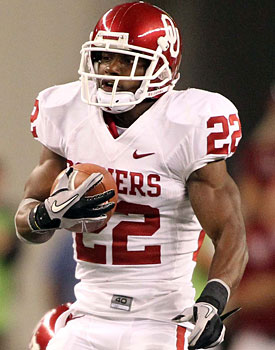
 1. Oklahoma: Last August, Stoops told his freshman class it had the potential to be the best he ever had at OU. Kenny Stills then caught 61 passes as a freshman. Linebacker Tony Jefferson was the Big 12 Co-Defensive Newcomer of the Year. That 2010 recruit class is maturing before our eyes at the right time. 2011 MVP: Broyles. Previous rank: 2
1. Oklahoma: Last August, Stoops told his freshman class it had the potential to be the best he ever had at OU. Kenny Stills then caught 61 passes as a freshman. Linebacker Tony Jefferson was the Big 12 Co-Defensive Newcomer of the Year. That 2010 recruit class is maturing before our eyes at the right time. 2011 MVP: Broyles. Previous rank: 2  2. Alabama: The defense is at the 2009 level. It really doesn't matter who plays quarterback. Trent Richardson will make enough plays and the offensive line will keep A.J. McCarron/Phillip Sims clean. 2011 MVP: Dont'a Hightower. Previous rank: 4
2. Alabama: The defense is at the 2009 level. It really doesn't matter who plays quarterback. Trent Richardson will make enough plays and the offensive line will keep A.J. McCarron/Phillip Sims clean. 2011 MVP: Dont'a Hightower. Previous rank: 4  3. LSU: A still-shaky Jordan Jefferson and the season's biggest game being at Alabama are keeping the Tigers from staying at No. 1 at this point. 2011 MVP: Spencer Ware. Previous rank: 1
3. LSU: A still-shaky Jordan Jefferson and the season's biggest game being at Alabama are keeping the Tigers from staying at No. 1 at this point. 2011 MVP: Spencer Ware. Previous rank: 1  4. Oregon: The Ducks are getting ready to go on a USC-like run in dominating the Pac-10/Pac-12. Chip Kelly's biggest challenge will be replacing those key defenders and keeping the Willie Lyles thing from mushrooming. 2011 MVP: LaMichael James. Previous rank: 3
4. Oregon: The Ducks are getting ready to go on a USC-like run in dominating the Pac-10/Pac-12. Chip Kelly's biggest challenge will be replacing those key defenders and keeping the Willie Lyles thing from mushrooming. 2011 MVP: LaMichael James. Previous rank: 3  5. Stanford: The Cardinal are still tougher than you think on both sides of the ball. New coach David Shaw gets the luxury of starting what would have been a No. 1 NFL Draft choice at quarterback. 2011 MVP: Duh, Andrew Luck. Previous rank: 5
5. Stanford: The Cardinal are still tougher than you think on both sides of the ball. New coach David Shaw gets the luxury of starting what would have been a No. 1 NFL Draft choice at quarterback. 2011 MVP: Duh, Andrew Luck. Previous rank: 5  6. Oklahoma State: Below Oklahoma, Okie State and Texas A&M will battle it out in the reconfigured Big 12. The Cowboys have the slight advantage for now because Brandon Weeden came back to throw to Justin Blackmon. 2011 MVP: Weeden. Previous rank: 7
6. Oklahoma State: Below Oklahoma, Okie State and Texas A&M will battle it out in the reconfigured Big 12. The Cowboys have the slight advantage for now because Brandon Weeden came back to throw to Justin Blackmon. 2011 MVP: Weeden. Previous rank: 7  7. Texas A&M: Mike Sherman doubters are now being rounded up by Aggie cadets and forced to kiss their dates -- even if they don't have dates! Hilarity ensues as defenses try to stop one of the most explosive offenses in the nation. 2011 MVP: Jeff Fuller. Previous rank: 8
7. Texas A&M: Mike Sherman doubters are now being rounded up by Aggie cadets and forced to kiss their dates -- even if they don't have dates! Hilarity ensues as defenses try to stop one of the most explosive offenses in the nation. 2011 MVP: Jeff Fuller. Previous rank: 8  8. Florida State: Figure on a second consecutive 10-win season (at least) and an ACC title. After a long wait, the 'Noles emerge again on the national stage. 2011 MVP: Brandon Jenkins. Previous rank: 11
8. Florida State: Figure on a second consecutive 10-win season (at least) and an ACC title. After a long wait, the 'Noles emerge again on the national stage. 2011 MVP: Brandon Jenkins. Previous rank: 11  9. Ohio State: Since the Bucks' best players will play slightly more than half the season, it's up to the interim head coach to hold the program together. The amazing thing is there is still enough talent to win the Big Ten and contend for a national title. 2011 MVC(oach): Luke Fickell. Previous rank: 6
9. Ohio State: Since the Bucks' best players will play slightly more than half the season, it's up to the interim head coach to hold the program together. The amazing thing is there is still enough talent to win the Big Ten and contend for a national title. 2011 MVC(oach): Luke Fickell. Previous rank: 6  10. Nebraska: 2011 If quarterback Taylor Martinez stays consistent and upright, the Huskers could win their first conference title in 12 years and their first in the Big Ten. 2011 MVP: Lavonte David (school-record 152 tackles). Previous rank: 14
10. Nebraska: 2011 If quarterback Taylor Martinez stays consistent and upright, the Huskers could win their first conference title in 12 years and their first in the Big Ten. 2011 MVP: Lavonte David (school-record 152 tackles). Previous rank: 14  11. Michigan State: Eleven wins and a shared Big Ten title while enduring Mark Dantonio's heart attack showed the Spartans are mentally strong. They aren't bad physically either. Watch for a battle with Nebraska for the Legends Division title. 2011 MVP: Kirk Cousins. Previous rank: 9
11. Michigan State: Eleven wins and a shared Big Ten title while enduring Mark Dantonio's heart attack showed the Spartans are mentally strong. They aren't bad physically either. Watch for a battle with Nebraska for the Legends Division title. 2011 MVP: Kirk Cousins. Previous rank: 9  12. Wisconsin: Why can't the Badgers find a difference-maker at quarterback? Scott Tolzien seems soooo 2010. Tailback James White should run for at least 1,500 yards behind the usual group of road-graders. 2011 MVP: White. Previous rank: 10
12. Wisconsin: Why can't the Badgers find a difference-maker at quarterback? Scott Tolzien seems soooo 2010. Tailback James White should run for at least 1,500 yards behind the usual group of road-graders. 2011 MVP: White. Previous rank: 10  13. Arkansas: Lose Ryan Mallett and get better? Could happen to the Hogs, who have a legit running threat in Knile Davis (4.29 40 during the spring) and what looks like an improved defense. 2011 MVP: Davis. Previous rank: 12
13. Arkansas: Lose Ryan Mallett and get better? Could happen to the Hogs, who have a legit running threat in Knile Davis (4.29 40 during the spring) and what looks like an improved defense. 2011 MVP: Davis. Previous rank: 12  14. Boise State: I'd like to formally welcome the Broncos to Division I-A after the program was accused of major violations by the NCAA. Boise will win in a new conference (Mountain West) and underappreciated Kellen Moore will make himself a steal in the 2012 draft. 2011 MVP: Moore. Previous rank: 13
14. Boise State: I'd like to formally welcome the Broncos to Division I-A after the program was accused of major violations by the NCAA. Boise will win in a new conference (Mountain West) and underappreciated Kellen Moore will make himself a steal in the 2012 draft. 2011 MVP: Moore. Previous rank: 13  15. Auburn: For now, the 2010 championship still counts. Forever, Cam Newton is gone. That's the biggest difference in the 2011 Tigers. There will be a lot of payback waiting in the SEC but Auburn will still be dangerous. 2011 MVP: Michael Dyer. Previous rank: 15
15. Auburn: For now, the 2010 championship still counts. Forever, Cam Newton is gone. That's the biggest difference in the 2011 Tigers. There will be a lot of payback waiting in the SEC but Auburn will still be dangerous. 2011 MVP: Michael Dyer. Previous rank: 15  16. TCU: After a Rose Bowl win, Gary Patterson won't let the Frogs slip too much. Watch surprising Casey Pachall take the place of Andy Dalton at quarterback. 2011 MVP: Tank Carder. Previous rank: 16
16. TCU: After a Rose Bowl win, Gary Patterson won't let the Frogs slip too much. Watch surprising Casey Pachall take the place of Andy Dalton at quarterback. 2011 MVP: Tank Carder. Previous rank: 16  17. Virginia Tech: The Hokies run the ball, play defense and usually have the best special teams in the nation. Add to the mix quarterback Logan Thomas, who is already being compared to a certain Heisman winner from Auburn. Yes, it's altogether possible to under rate the Hokies. Again. 2011 MVP: Thomas. Previous rank: 18
17. Virginia Tech: The Hokies run the ball, play defense and usually have the best special teams in the nation. Add to the mix quarterback Logan Thomas, who is already being compared to a certain Heisman winner from Auburn. Yes, it's altogether possible to under rate the Hokies. Again. 2011 MVP: Thomas. Previous rank: 18  18. South Carolina: Doesn't everybody deserve a fifth chance? That's what Stephen Garcia is getting from Steve Spurrier. Hey, it's the SEC. They don't ask how many suspensions, they ask how many wins. 2011 MVP: Alshon Jeffrey. Previous rank: 17
18. South Carolina: Doesn't everybody deserve a fifth chance? That's what Stephen Garcia is getting from Steve Spurrier. Hey, it's the SEC. They don't ask how many suspensions, they ask how many wins. 2011 MVP: Alshon Jeffrey. Previous rank: 17  19. Notre Dame: An impressive Sun Bowl win over Miami and the return of 19 starters (if you include Michael Floyd) make this the best Irish team since Charlie Weis took Notre Dame to the Sugar Bowl in 2006. Team speed remains an issue. 2011 MVP: Floyd. Previous rank: 19
19. Notre Dame: An impressive Sun Bowl win over Miami and the return of 19 starters (if you include Michael Floyd) make this the best Irish team since Charlie Weis took Notre Dame to the Sugar Bowl in 2006. Team speed remains an issue. 2011 MVP: Floyd. Previous rank: 19  20. Mississippi State: It's still hard to believe the Dawgs won nine in a division that includes Auburn, Alabama and Arkansas. It will be hard to duplicate that number next season. 2011 MVP: Vick Ballard. Previous rank: 20.
20. Mississippi State: It's still hard to believe the Dawgs won nine in a division that includes Auburn, Alabama and Arkansas. It will be hard to duplicate that number next season. 2011 MVP: Vick Ballard. Previous rank: 20.  21. Arizona State: Twenty-four Sun Devils started at least five games in 2010. In a down Pac-12, Arizona State may make up one-half of the conference's first championship game. 2011 MVP: Vontaze Burfict. Previous rank: 22
21. Arizona State: Twenty-four Sun Devils started at least five games in 2010. In a down Pac-12, Arizona State may make up one-half of the conference's first championship game. 2011 MVP: Vontaze Burfict. Previous rank: 22  22. Utah: Yes, there are too many holes on defense. No, there will not be a BCS bowl this season. But the Utes won't slip far. Kyle Whittingham's worst record is 7-5 in 2005, his first after replacing Urban Meyer. 2011 MVP: Jordan Wynn. Previous rank: NR
22. Utah: Yes, there are too many holes on defense. No, there will not be a BCS bowl this season. But the Utes won't slip far. Kyle Whittingham's worst record is 7-5 in 2005, his first after replacing Urban Meyer. 2011 MVP: Jordan Wynn. Previous rank: NR  23. Georgia: Mark Richt continues to recruit good players who may or may not improve while at Georgia. There is a tinge of optimism in '11 with the return of an experienced quarterback (Aaron Murray). Watch out for disaster, though, if the Dawgs lose to Boise and South Carolina to open the season. 2011 MVP: Murray. Previous rank: 21
23. Georgia: Mark Richt continues to recruit good players who may or may not improve while at Georgia. There is a tinge of optimism in '11 with the return of an experienced quarterback (Aaron Murray). Watch out for disaster, though, if the Dawgs lose to Boise and South Carolina to open the season. 2011 MVP: Murray. Previous rank: 21  24. West Virginia: Can anyone say, "Awkward"? The offensive coordinator, Dana Holgorsen, will succeed the head coach, Bill Stewart, in 2012. That's already been decided. What hasn't been is how the Mountaineers rebound from the loss of tailback Noel Devine and receiver Jock Sanders. Holgorsen tends to make big stars of his skill players. 2011 MVP: Geno Smith. Previous rank: NR
24. West Virginia: Can anyone say, "Awkward"? The offensive coordinator, Dana Holgorsen, will succeed the head coach, Bill Stewart, in 2012. That's already been decided. What hasn't been is how the Mountaineers rebound from the loss of tailback Noel Devine and receiver Jock Sanders. Holgorsen tends to make big stars of his skill players. 2011 MVP: Geno Smith. Previous rank: NR  25. Florida: In a transition year for Gator football, Will Muschamp will keep Florida on the right side of .500 but not much more than that. 2011 MVP: Ronald Powell. Previous rank: T-25
25. Florida: In a transition year for Gator football, Will Muschamp will keep Florida on the right side of .500 but not much more than that. 2011 MVP: Ronald Powell. Previous rank: T-25